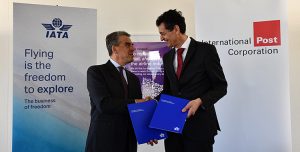
New agreement to enhance cooperation between airlines and postal operators

 The International Air Transport Association (IATA) and the International Post Corporation (IPC) have signed a Memorandum of Understanding (MoU) to reinforce cooperation between the two organisations.
The International Air Transport Association (IATA) and the International Post Corporation (IPC) have signed a Memorandum of Understanding (MoU) to reinforce cooperation between the two organisations.
The aim for both IATA and IPC is to promote the development and expansion of safe, secure, accessible and high-quality airmail and air cargo services to help their respective members provide quality solutions aligned to consumer needs.
“International e-commerce is growing at around 20% per year, leading to rapidly changing market conditions for airlines and posts. Ensuring customers get their packages on time while safety and security in postal air transport is maintained is the main priority for posts and air transport operators alike. Cooperation across the supply chain is a must and our MoU with IPC is an important step toward strengthening our activity in this area,” said IATA’s Director General and CEO, Alexandre de Juniac.
“For more than 10 years, the cooperation between airlines and postal operators has enhanced processes and increased visibility of airmail transport. With this agreement, we want to further strengthen our ties and identify further opportunities for cooperation and joint developments. Both of our sectors can win from a reinforced cooperation in terms of competitiveness and quality of service. Ultimately, this agreement will benefit consumers through more reliable and faster delivery of cross-border mail and packets transported by air,” said Holger Winklbauer, CEO of IPC.
IATA and IPC intend to work together on seven specific areas:
1. Improving the security, handover, carriage, delivery and settlement of airmail between postal operators and air carriers. This includes e-commerce, economic and commercial matters.
2. Developing and maintaining industry standards and procedures as well as services and solutions for both physical flows and electronic data interchange relating to airmail.
3. Aligning existing services and solutions, along with developing new ones to ensure harmonised compatibility and efficient application of resources.
4. Finding technology-based standards and solutions for piece level tracking in airmail.
5. Addressing volumetric challenges, through initiatives such as Air Packet Box, and allocation and booking procedures for airmail.
6. Developing regional onboarding initiatives and global campaigns on airmail process optimisation and standardisation.
7. Improving the involvement of ground handlers and other industry stakeholders on matters concerning airmail.










